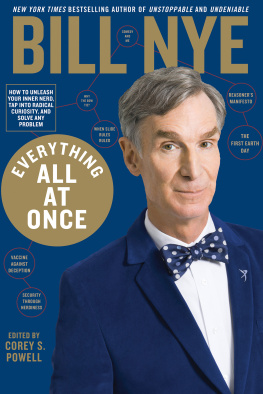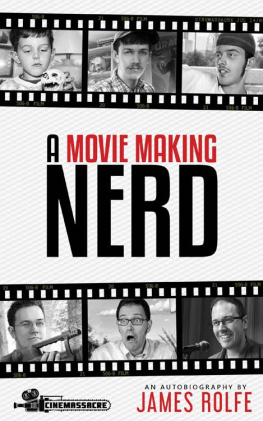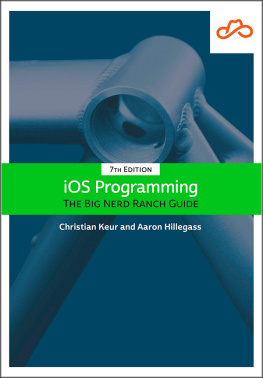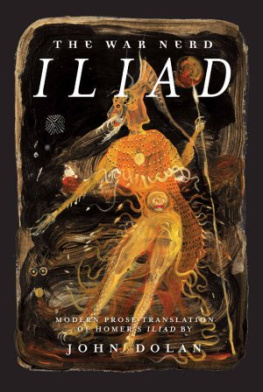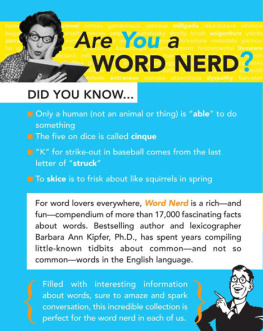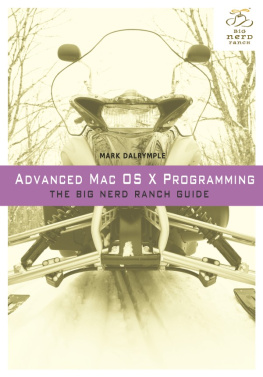
We can change the world. Im sure of it.
Lets go.

CONTENTS
BILLS GUIDE TO DOING
EVERYTHING ALL AT ONCE
OBJECTIVE:
CHANGE the WORLD
EVERYONE youll ever meet knows something you DONT.
GOOD ENGINEERING invites right use.
Constraints provide OPPORTUNITIES.
Be part of the START.
Think COSMICALLY; act LOCALLY.
QUESTION before you BELIEVE.
CHANGE YOUR MIND when you need to.
Be OPTIMISTIC; be RESPONSIBLE; be PERSISTENT.
PART I
Principles of Nerd Living

CHAPTER 1
The Tao of Phi
T his is a book about everything. It is about everything I know and about everything I think you should know, too.
I realize that may sound a little crazy, but Im completely serious. We live in an age of unprecedented access to information. When you pick up your phone or open your laptop and go online, you are instantly connected to a trillion trillion bytes of data; thats a 1 followed by 24 zeros. Every year another billion trillion bytes of data move around the Internet, carrying everything from those important videos with kitty cats to the arcane but fantastic detailed results of subatomic particle collisions at the Large Hadron Collider. In that sense, talking about everything is easy. Everything you and I know, and everything we need to know, is already out there for the taking.
Yet despite all those whizzing ones and zerosthe collective intelligence of billions of human brainsI still feel that we seem awfully... well, stupid. Were not using all this shared wisdom to solve big problems. Were not facing up to climate change. We havent figured out how to make clean, renewable, reliable energy available to everyone. Too many people die in avoidable auto accidents, succumb to curable diseases, do not get enough food and clean water, and still do not have access to the Internets great busy beehive mind. Despite being more connected than ever before, were not particularly generous toward, or understanding of, one another, preferring to hide behind denial and personal bias. The flood of information has effectively allowed us to know something about everything, but that knowing is clearly not enough. We need to be able to sort the facts and put our knowledge into action, and that is why I wrote this book.
I want to see humanity band together and change the world. I think it will take a special kind of personality to get this done: people who can handle the modern overflow of information, take in everything all at once, and select the parts that matter. It requires rigorous honesty about the nature of our problems. It requires creative irreverence in the search for solutions. The process of science and natural laws dont care about our politics or preconceptions. They merely set the boundaries of what is possible, defining the outer limits of what we can achieveor not, should we shy away from the challenge.
Fortunately, there is a large and growing clan of people who think that way, who love nothing better than using the tools of reason to solve the most unsolvable-looking puzzles. We call them nerds, and I humbly (proudly) count myself among them. I have spent a lifetime developing the nerd mindset and trying to master the admirable but often elusive qualities that come with it: persistence in the pursuit of a lofty goal, resilience to keep trying no matter what the obstacles are, humility for when one approach turns out to be a dead end, and the patience to examine the problem from every angle until a path forward becomes clear. If you already consider yourself one of us, then join me in doing more by applying your nerdiness to the big problems of the day, not just to trivia or minutia (although of course we will set aside plenty of time for those). And if you dont consider yourself a nerd yet, join me all the same: You will soon discover that everybody has an inner nerd waiting to be awoken by the right passion. My whole life has been a series of those kinds of awakenings, moments of epiphany when I became evermore aware of the joyous power of science, math, and engineering.
It happened to me with a jolt in the 11th grade in Washington, DC, when I took formal physics for the first time. In nerd culture, we might write that it was my phirst phormal physics, and wed phind that phrasing rather phunny. The ph pronounced phonetically with the same fricative that produces the sound from the consonant f is from phi, the Greek letter . The Roman p looks vaguely like a Greek . In Greek, the f sounds a little breathy, so the Roman letter h serves to preserve that sound or tradition. I couldnt help myselfI had to stop typing and look up the roots of the ph in our words physics and phosphate. When we see these ph words, we know they came to us from ancient Greek and then Latin. The scholars call it transliteration, meaning across the letters. Centuries ago a diligent, perhaps even enthusiastic, transliterator was inclined to add that h to the p, and here we are. Phew.
This little digression encapsulates what it means to be so into a topic, so phocused and phascinated by some aspect of nature or the human experience, that people consider youor more important, you consider yourselfa nerd. For me to really enjoy some deliberate misspelled wordplay, I had to think about the background of , ph, and f. I called on my knowledge that most English speakers pronounce the letter like the second syllable in Wi-Fi, but Greek speakers pronounce like fee, as in Fee-fi-fo-fum, / I smell the blood of a nerdy one. And as I was checking that out, I recalled that has other intriguing connections to physics besides the linguistic one. It is the mathematical symbol denoting the golden ratio, a fundamental geometric proportion that appears widely in biology, economics, and especially art. In statistics, is a measure of the correlation between two separate factors, and so it is a crucial measure for distinguishing chance events from cause and effect in scientific experiments. Stick that in your back pocket.
You might regard the things I just told you as little more than bits of playful trivia, but I beg to differ. The knowledge I gained in my obsessive pursuit of changed me a little, and it just changed you, as well. The impulse to chase down details is central to the way I have solved problems throughout my life. It is also, not coincidentally, a defining nerd trait. Further evidence of my detail-oriented outlook: Long before the ubiquity of the Internet, my friends would say about me, The party doesnt start until Bill gets out the dictionary. I like to know the background of words, the etymology, as well as the meanings of the words themselves. While I was reflecting on the digraph ph just now, I was also reflecting on what started that train of thoughtnamely physics, the study of nature, specifically energy and motionand the joy I felt when I was first (or phirst) exposed to it.
The word scientist was coined in 1833 by the English natural philosopher William Whewell. Before then, the term was natural philosopher, which sounds a little odd today but back then was a familiar expression. Philosophy is the study of knowledge; philosophers seek ways to know whether or not something is true, so natural philosophy was the study of whats true in nature. Or, in modern terms, a scientist is a natural philosopher seeking objective truths.
Next page

